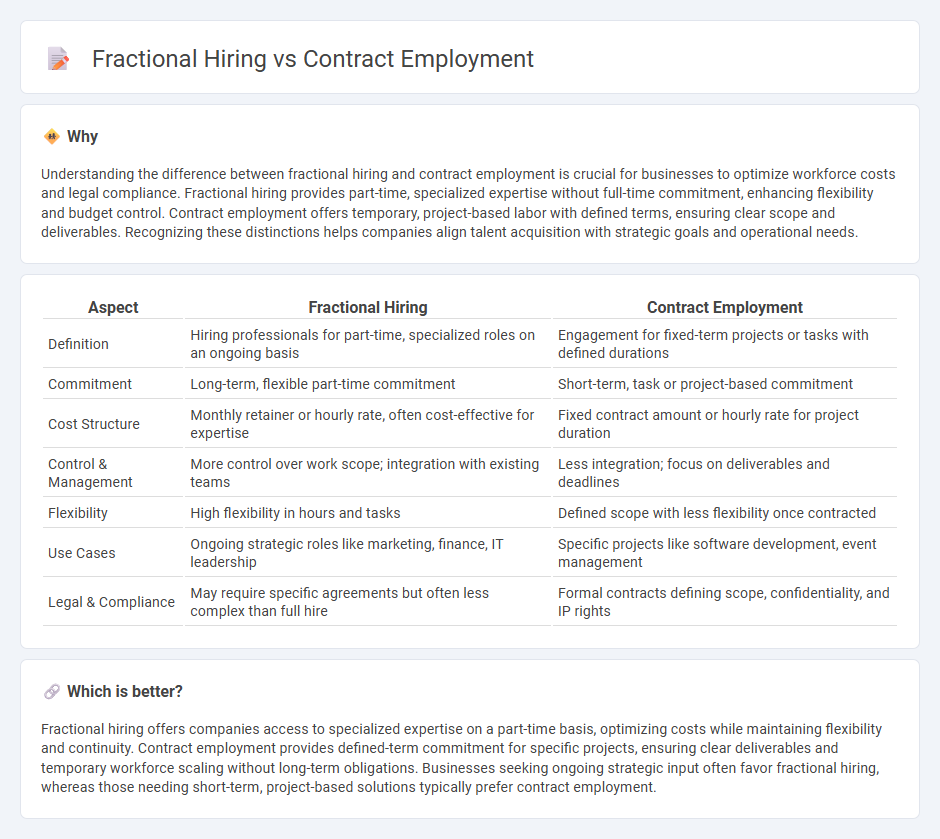
Fractional hiring offers businesses access to specialized talent on a part-time basis, optimizing costs and flexibility compared to full-time roles. Contract employment typically involves fixed-term agreements with defined project scopes, providing clear deliverables and timelines. Explore the key differences and benefits of fractional hiring versus contract employment to determine the best fit for your workforce strategy.
Why it is important
Understanding the difference between fractional hiring and contract employment is crucial for businesses to optimize workforce costs and legal compliance. Fractional hiring provides part-time, specialized expertise without full-time commitment, enhancing flexibility and budget control. Contract employment offers temporary, project-based labor with defined terms, ensuring clear scope and deliverables. Recognizing these distinctions helps companies align talent acquisition with strategic goals and operational needs.
Comparison Table
| Aspect | Fractional Hiring | Contract Employment |
|---|---|---|
| Definition | Hiring professionals for part-time, specialized roles on an ongoing basis | Engagement for fixed-term projects or tasks with defined durations |
| Commitment | Long-term, flexible part-time commitment | Short-term, task or project-based commitment |
| Cost Structure | Monthly retainer or hourly rate, often cost-effective for expertise | Fixed contract amount or hourly rate for project duration |
| Control & Management | More control over work scope; integration with existing teams | Less integration; focus on deliverables and deadlines |
| Flexibility | High flexibility in hours and tasks | Defined scope with less flexibility once contracted |
| Use Cases | Ongoing strategic roles like marketing, finance, IT leadership | Specific projects like software development, event management |
| Legal & Compliance | May require specific agreements but often less complex than full hire | Formal contracts defining scope, confidentiality, and IP rights |
Which is better?
Fractional hiring offers companies access to specialized expertise on a part-time basis, optimizing costs while maintaining flexibility and continuity. Contract employment provides defined-term commitment for specific projects, ensuring clear deliverables and temporary workforce scaling without long-term obligations. Businesses seeking ongoing strategic input often favor fractional hiring, whereas those needing short-term, project-based solutions typically prefer contract employment.
Connection
Fractional hiring and contract employment are connected through their focus on flexible workforce solutions, allowing businesses to engage specialized talent for specific projects or durations without full-time commitments. Both approaches optimize operational costs and enhance agility by providing access to skilled professionals on demand. By leveraging fractional and contract hires, companies can scale teams efficiently while maintaining control over resources and budgets.
Key Terms
Fixed-term Agreement
Fixed-term agreements in contract employment specify a clear start and end date, offering companies predictable labor costs and defined project timelines. Fractional hiring allows businesses to engage experts on a part-time basis without long-term commitments, promoting flexibility but often lacking the strict time constraints of fixed-term contracts. Explore the differences further to determine the best fit for your workforce strategy.
Part-time Engagement
Part-time engagement in contract employment typically involves fixed-term agreements with clear deliverables and hourly commitments, allowing companies to manage workload fluctuations efficiently. Fractional hiring offers specialized expertise on a part-time basis, often aligning senior-level skills with specific project needs without the overhead of full-time employment. Explore how each model can optimize your workforce strategy and reduce operational costs.
Project-based Assignment
Contract employment offers clear terms for project-based assignments with fixed durations and defined deliverables, ensuring dedicated resources. Fractional hiring allows access to specialized skills on a part-time basis, optimizing budget and flexibility for specific project phases. Explore these approaches to determine which aligns best with your project's goals and resource needs.
Source and External Links
What is a Contract Job? How Contract Employment Works - A contract job is an employment opportunity where an employee works for a company under a specific contract for a set period, often linked to project completion or a fixed term such as six to twelve months, differing from indefinite at-will salaried employment.
What Is a Contract Employee | Rippling Glossary - A contract employee is hired to complete a specific project or assignment for a defined period under a written contract, typically without the benefits or job security of permanent employees and often paid per project rather than by salary.
What Is a Contract Employee? | Indeed.com - Contract employees are hired for specific projects or timeframes, offering employers advantages such as lower commitment and cost, specialized skills, but may present downsides including less loyalty and limited availability compared to permanent staff.
 dowidth.com
dowidth.com